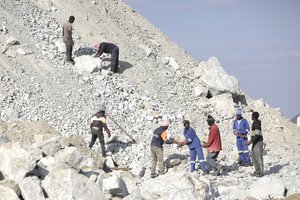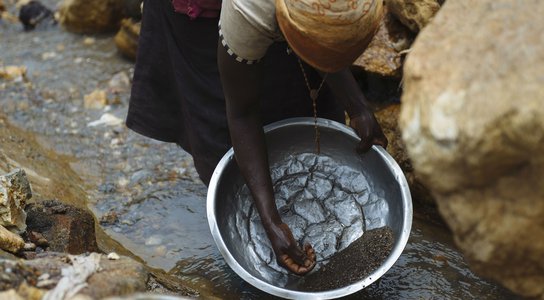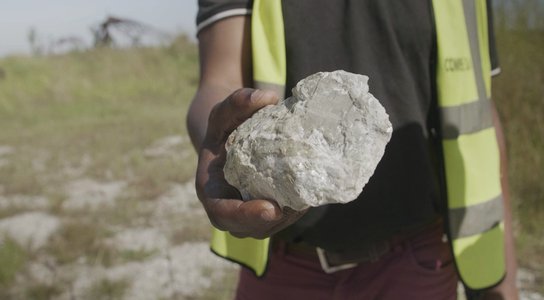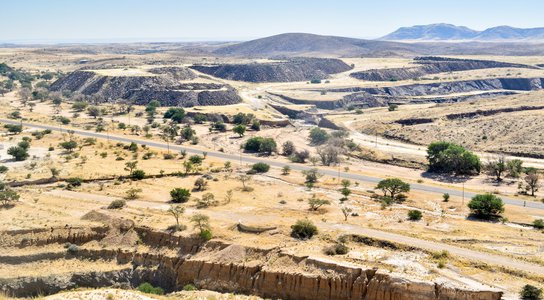The European Commission has shared ambitious climate targets for 2040. But question marks remain over how it will sustainably and responsibly source the minerals that will fuel a clean energy transition.
As part of its plan to become the first carbon-neutral continent, the EU announced that it will aim to reduce its greenhouse gas emissions by 90% in 2040.
That’s going to require massive investment in clean energy technologies like electric vehicles, wind turbines and solar panels. Those technologies rely on minerals like lithium and cobalt, making them central to the transition. But the urgency of the climate crisis is overshadowing the harmful impact of mining these minerals.
Our investigations have revealed the global mining industry’s dirty history, littered with human rights abuses, corruption and environmental harm. As the EU navigates geo-political powerplays and negotiates with resource rich countries for key minerals, policy makers must make sure that the energy transition is just and equitable.
The EU and US are playing catch-up to China
China continues to dominate the clean energy market. According to the International Energy Agency, China commissioned as much solar PV energy in 2023 as the entire world did in 2022, while its wind additions also grew by 66% year-on-year.
The US and the EU have simply not kept up. In the US, bipartisan politics were a blocking force until President Biden passed the Inflation Reduction Act (IRA), which seeks to increase clean energy production through incentives like tax credits.
The EU meanwhile, has put in place the Renewable Energy Directive to mandate the development of clean energy across all sectors of the EU economy and to support co-operation between EU countries since 2009. Despite incremental updates to the bloc's renewables targets since, its relative lack of progress towards rolling out clean energy was thrown into sharp relief after Russia's invasion of Ukraine, exposing the extent of the EU's dependence on Russian gas.
The CRMA marks the start of a European race for minerals
Responding to the energy crisis that followed the invasion of Ukraine, European lawmakers hurriedly put together the Critical Raw Materials Act (CRMA), aimed at speeding up the EU’s access to transition minerals from around the world, while also driving up domestic mining and recycling.
Member States also geared up their efforts. Sweden – as one of the only European countries with significant domestic mining – lobbied hard for the relaxation of existing environmental protections in the hope of expanding its mining programme and cashing in on the EU’s targets. France announced a €2billion investment plan for securing critical minerals, which Germany quickly matched. Italy meanwhile has been working on securing alliances with other European countries. Poland’s elections have seen the new government enter the race with ambitious new renewables targets.

Workers pick lithium at Sandawana Mines in Mberengwa, Zimbabwe. CREDIT: AARON UFUMELI/EPA-EFE/Shutterstock
Will the energy transition be just?
With the CRMA signed, sealed and on its way to being delivered into law, it may seem as though not much else can be done to influence this crucial policy area in the next year. But while the CRMA headlines focused on setting mineral supply targets, the EU is still working out how to practically achieve them.
The bloc is in the midst of signing a flurry of new partnership memorandums on accessing transition minerals in resource rich countries. For example, the Memorandum of Understanding (MOU) between the EU and DRC, and the EU and Zambia will use the Global Gateway ( a new European strategy to boost smart, clean and secure links in digital, energy and transport sectors) to invest in the Lobito corridor - a proposed railway line and trade route connecting the transition minerals mines in Zambia and DRC with the Lobito port in Angola - in exchange for greater access to transition minerals. The corridor will be a tool for exporting minerals, but crucially the MOU does not refer to any processing (where much greater profit is made) taking place within DRC and Zambia. Without this commitment, countries rich in minerals may not see a fair share of the profits of mining activities and past mistakes of reckless colonial extraction practices could be repeated.
Similarly, the memorandum signed with Chile includes references to Environmental, Social and Governance (ESG) needs, but does not go into the necessary detail on preventing human rights abuses against Indigenous land defenders, nor for preventing the desertification associated with lithium extraction in South America. Over 100 civil society organisations have signed an open letter to European parliamentarians urging them to reconsider their support for this trade deal, arguing the deal will encourage irresponsible mining resulting in harmful social and ecological impacts whilst undermining Chile’s own industrial development.
Making the EU’s targets work for a just transition
The upcoming European elections and global political shifts offer opportunities for recalibration. Steering the EU towards a collaborative, ethical, and responsible stance is essential for navigating this pivotal year.
As the CRMA progresses to national law, it is critical that the EU refines legislation to incorporate detailed provisions on environmental and social safeguards around mineral mining. It must include requirements for mining companies to engage in meaningful consultation and gain free, prior and informed consent from communities affected by mining.
This will be crucial to ensuring that the transition mineral rush does not repeat the environmental and social harms caused by the fossil fuel industry. We have a crucial opportunity to transform economies and uplift communities and societies - the EU and its strategic partners must deliver a just transition for both people and the planet.


